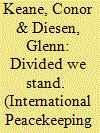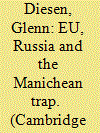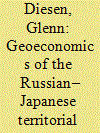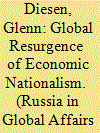| Srl | Item |
| 1 |
ID:
145154


|
|
|
|
|
| Summary/Abstract |
Assessing missile defence through the prism of offence–defence theory requires primarily an examination of legal and structural constraints on future development. New weapons technology is frequently cited as having the most critical impact on the offence–defence balance. Yet, the method for assessing the introduction of a new weapons technology tends to neglect projected maturity and instead focus excessively on the initial rudimentary capabilities. It is argued here that the North Atlantic Treaty Organisation’s (NATO’s) missile defence is set to incrementally become more advanced in terms of quality, quantity and mobility, which is supported by a strategy that is increasingly favouring offence. As the system gradually enhances the offensive advantage vis-à-vis Russia, NATO categorically rejects any legal or structural constraints on future deployments.
|
|
|
|
|
|
|
|
|
|
|
|
|
|
|
|
| 2 |
ID:
139196


|
|
|
|
|
| Summary/Abstract |
Afghanistan was the first major test for US nation-building efforts in the twenty-first century. Previous analyses have identified many of the barriers that prevented the USA from engaging in effective infrastructure development, governance, security, counter-insurgency and counter-narcotics. Drawing upon interviews with senior US officials, this article offers an alternative account of the nation-building experience that highlights problems within the US government. Building on the assertions of Graham Allison, it focuses on the behaviour of the agencies and individuals within the US bureaucracy. It is argued that a lack of effective leadership permitted bureaucratic disorder between and within the military establishment, the State Department and the United States Agency for International Development (USAID). The conflict that was precipitated by this dissonance prevented the emergence of a cohesive nation-building strategy.
|
|
|
|
|
|
|
|
|
|
|
|
|
|
|
|
| 3 |
ID:
169569


|
|
|
| 4 |
ID:
157530


|
|
|
|
|
| Summary/Abstract |
Conceptualizing the EU as a postmodern cooperative power that “transcends realism” provides ideological scaffolding for an exclusive conception of “Europe” and veils a zero-sum geopolitical project as “European integration”. Neoclassical realism considers assigning morally opposite political identities to the EU and Russia to be “rational” to the extent it strengthens internal cohesion and mobilizes resources to enhance security in accordance with the balance of power logic. Yet, the artificial binary construction can also produce a Manichean Trap when compromises required to enhance security are depicted as a betrayal of indispensable virtues and “Europe”. The ability to harmonize competing security interests diminishes as the conceptual space for comparing the EU and Russia is de-constructed. Competition is framed in uncompromising terms as “European integration” versus Russian “spheres of influence” and democracy versus authoritarianism.
|
|
|
|
|
|
|
|
|
|
|
|
|
|
|
|
| 5 |
ID:
160432


|
|
|
|
|
| Summary/Abstract |
Russia’s effort to become a geoeconomic power in Asia alters the dynamics of the territorial dispute with Japan. Both Moscow and Tokyo aim to prevent Russia’s geoeconomic “pivot to Asia” becoming merely a pivot to China. Yet, a settlement is obstructed by the growing geoeconomic value of the Southern Kurils and Japan’s lack of an autonomous foreign policy.
|
|
|
|
|
|
|
|
|
|
|
|
|
|
|
|
| 6 |
ID:
161054


|
|
|
|
|
| Summary/Abstract |
Economic nationalism advocates state intervention in the market to create favorable symmetry in economic interdependence with other powers. All major economies have ascended to greatness with state interventions, and economic liberalism becomes a mere covert economic nationalism by hegemons. Once in control over the levers of the global economy it is in the interest of the hegemon to propagate economic liberalism to integrate other powers into asymmetrical interdependent partnerships. The Trump administration’s embrace of overt economic nationalism indicates the unravelling of the U.S. privileged geo-economic position. Relative decline is evident by a crumbling U.S. manufacturing base and narrowing superiority in innovations, the creation of alternative trade corridors outside U.S. control, and nascent rivals to the Bretton Wood institutions and the U.S. dollar. As geo-economic power shifts from the West to the East and invokes a global resurgence of economic nationalism, opportunities arise for Russia to develop more symmetry in the interdependent global economy.
|
|
|
|
|
|
|
|
|
|
|
|
|
|
|
|
| 7 |
ID:
183413


|
|
|
|
|
| Summary/Abstract |
After the Cold War, the “end of history” thesis was largely
internalized and expressed with the assumption that the entire
world would unify under liberal principles, which would be enforced
under U.S. benign leadership. As the international distribution of
power shifts and the relative power of the West steadily declines,
the role of liberalism in domestic and international politics recedes.
Western states have increasingly expressed their concern about the
decline of the so-called “liberal international order.”
|
|
|
|
|
|
|
|
|
|
|
|
|
|
|
|
| 8 |
ID:
113312


|
|
|
|
|
| Publication |
2012.
|
| Summary/Abstract |
This article assesses former Russian President Dmitry Medvedev's proposal for a new security system and varying perspectives in the context of this development. US-led unipolarity has been undermined as a gradually more independent 'Europe' has weakened transatlantic unity and that of a broader 'West'. Russia could neither join the North Atlantic Treaty Organization or the European Union (EU), nor assume directorship for security in the former Soviet Union. It has nonetheless increased its ties and influence with the EU, becoming a major trade partner and the biggest supplier of energy resources. A discourse of multipolarity accompanies Russian geopolitical ambitions and incorporates demands for new arrangements that can facilitate reliable cooperation in the security field and beyond. This implies recognising and accommodating Russian interests, which presents challenges to existing organisations. Medvedev's proposal is viewed differently by political-security sectors in the United States, Germany, France, Poland, Russia and the hybrid EU.
|
|
|
|
|
|
|
|
|
|
|
|
|
|
|
|
| 9 |
ID:
165660


|
|
|